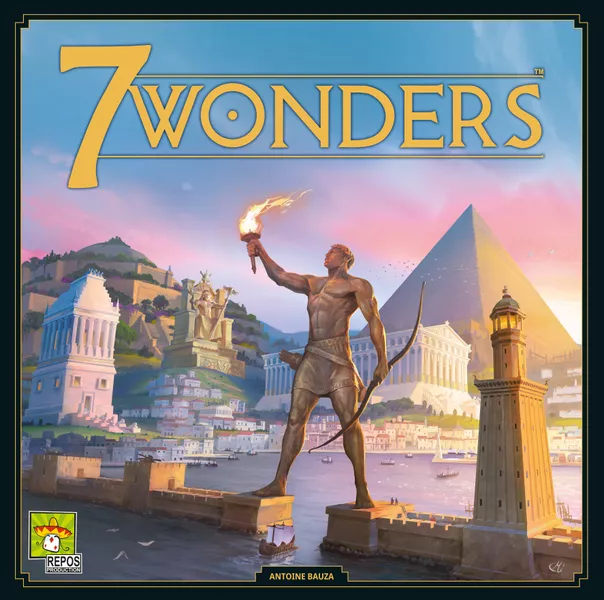Welcome to this week’s review! This week I’m discussing a game that was released 15 years ago but is still one of my favorites. So without further ado, let’s jump into my thoughts.
7 Wonders
- Designer: Antoine Bauza
- Publisher: Repos Production
- Complexity: Light
- Time: 30 Minutes
- Players: 2-7
- Main Mechanisms: Closed Drafting
7 Wonders was one of the first games in my collection. The game was my go-to whenever I was looking for a shorter and lighter game, as well one I could play with friends who were newer to board games. I recently picked up the second edition version of the game, and I thought now would be a good time to look back to determine if I still feel the same way about this classic as when I first played it.
7 Wonders is a closed drafting card game that plays out over three rounds, or otherwise known as Ages. During each Age, players are dealt a hand of seven cards. Simultaneously, all players choose one card to play, and then the rest of their hand is passed to their neighbor. This continues on until all players have played six cards which triggers the end of the Age.
I love the simultaneous nature of the turn structure because it means that the game can still be comfortably played up to the full seven player count without it noticeably increasing the game length. In addition, while the box indicates the game should take roughly 30 minutes, I have had games take almost half that time when playing with experienced players. The shorter runtime makes it possible for this game to hit the table more often than some of my longer and heavier games. This means that I can pull this game out during a gaming session when time is limited, or we can play multiple games of 7 Wonders back to back if time allows.
I also like that there are a variety of different viable strategies which makes the game feel fresh even after multiple repeat plays. The seven two-sided wonder boards also help mix things up in this regard, and the game rewards tactical players who are able to adapt to the hands they are dealt.
I mentioned that after selecting a card to play, you pass your hand to one of your neighbors which makes the game feel less like multiplayer solitaire. For example, if I see that my neighbor is focusing heavily on a certain card type, I may be encouraged to play that card instead of passing it to them. Also, at the end of each Age, you compare your military strength to each of your neighbors, with the winners receiving victory points and the losers losing victory points. There’s not a ton of player interaction, but what is included feels impactful.
I mentioned that the game flows smoothly even at higher player counts, but this does have a tradeoff. At lower player counts, you’re more likely to see the same hand twice, which gives you more control of the hand and allows you to plan for future turns knowing that at least some of the cards will come back to you again. Whereas at the full seven player count, you’re only going to see each hand once. Ultimately, while I’ll still happily play the game at the higher player counts, I think the game shines more with slightly fewer players because of the increased control.
While I’ve taught 7 Wonders to friends who are new to board games, the iconography does keep the game from being gateway-level. There are a large number of icons to explain which will likely be confusing to players who aren’t as familiar with these types of board games. More experienced gamers will pick this game up no problem, so I would likely consider 7 Wonders a good second or third game for players new to the hobby rather than the introduction game. While there are handy iconography reference sheets that make it easier to grasp for new players, these days I’m more likely to turn to one of these games if I’m looking for a gateway-level game.
Finally, as someone who has played numerous plays of 7 Wonders, I think the game really benefits from adding some of the expansions in to help keep the game feeling fresh. For someone just jumping in, it’s easy to recommend just the base game, but if you’re someone that likes a bit more variability or complexity, I would definitely recommend picking up at least one of the expansions.
7 Wonders is still one of my go-to games when I’m looking for something a bit lighter and shorter, which is why it was still in my top 40 games of all time last year. While the iconography keeps the game from being completely at the gateway-level, it is still an easy recommend for all types of gamers. Stay tuned for a review of the Leaders and Cities expansions coming soon.
With that, I’ll wrap up this week’s review! I’d love to hear your thoughts on any of the games I’ve mentioned or future content suggestions in the comments below. Happy gaming!
If you liked this post and want to be notified when new content is released, then follow me on Instagram @themeepledigest.
